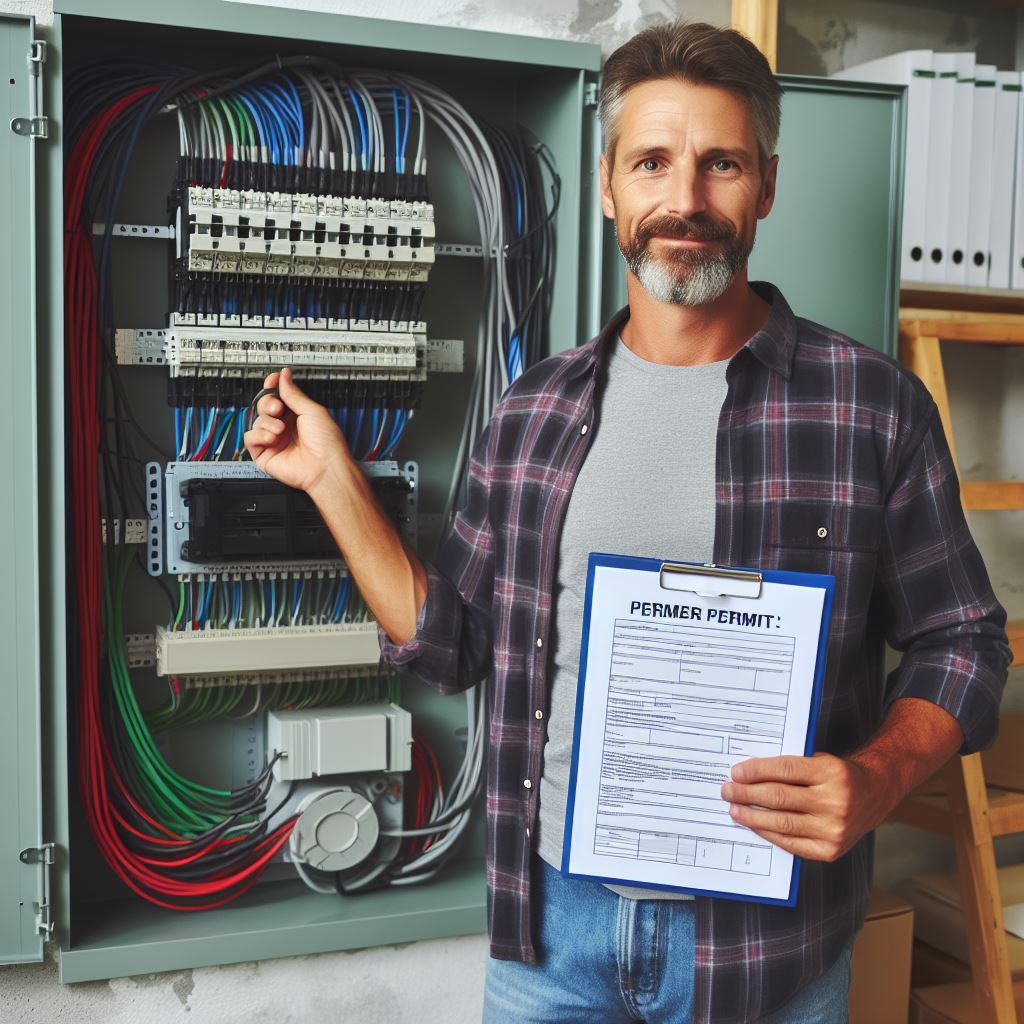Introduction
Electrical upgrades are essential for maintaining a safe and efficient home.
It is crucial to obtain permits when conducting such upgrades to ensure compliance with regulations and standards.
Neglecting permits can lead to serious consequences, including fines, unsafe installations, and insurance issues.
Furthermore, obtaining permits offers homeowners the assurance that their upgrades are being done by qualified professionals, making it a wise decision even if it seems like an inconvenient process.
By adhering to permit requirements, homeowners can guarantee that their electrical upgrades are legal, safe, and up to code, ensuring protection for themselves and their property.
Without a doubt, the importance of permits cannot be overstated in the realm of electrical upgrades.
Understanding Permit Requirements for Electrical Upgrades
Electrical upgrades play a crucial role in modernizing homes and ensuring the safety and efficiency of electrical systems.
However, it is important to understand the permit requirements associated with such upgrades to avoid legal issues and ensure compliance with regulations.
Definition and Purpose of Building Permits
Building permits are official documents issued by local authorities, such as city or county building departments, to regulate and control construction projects.
These permits serve as legal permission to begin construction, renovation, or alteration work on a property.
The primary purpose of building permits is to ensure that construction work adheres to safety and building code standards set by the government.
By obtaining a permit, homeowners and contractors commit to following the regulations outlined by the authorities, which include guidelines for electrical upgrades.
While it may seem like an additional bureaucratic hurdle, building permits hold significant importance.
They ensure that electrical upgrades are carried out safely, reducing the risk of electrical accidents, fires, and other hazards that may arise from faulty wiring, equipment, or installations.
Overview of Electrical Permit Requirements
Specific permit requirements exist for electrical upgrades due to the potential dangers associated with electrical work.
Transform Your Real Estate Decisions
Unlock personalized real estate insights crafted just for you. Get actionable advice designed to amplify your success.
Get StartedThese requirements are in place to maintain the integrity of electrical systems and safeguard the well-being of occupants.
Electrical permits are typically required for a range of projects, including installing new circuits, upgrading electrical panels, replacing wiring, or adding electrical outlets.
It is crucial to consult with the local building department or authority to determine the specific permit requirements for the intended electrical upgrade.
Local building departments or authorities play a key role in the permitting process for electrical upgrades.
They review permit applications, ensuring they comply with the relevant codes and regulations.
Inspections may also be conducted throughout the project to verify that the work meets the required standards.
Obtaining an electrical permit involves submitting detailed plans, specifications, and other relevant documentation outlining the intended upgrade.
Fees are typically associated with the permit application, although they vary depending on the location and scope of the project.
Failure to obtain the necessary electrical permits can have significant consequences.
Besides potential fines and legal implications, homeowners may face difficulties when selling their property. Insurers may also deny claims related to damages caused by unpermitted electrical work.
In fact, building permits, including electrical permits, are essential when undertaking any construction, renovation, or alteration work.
For electrical upgrades, these permits ensure compliance with safety and building code standards, reducing the risk of accidents, fire, and other hazards.
Consultation with local building departments or authorities is crucial to understand and fulfill the specific permit requirements for electrical upgrades.
Read: Fence & Deck Permits: What to Know
Showcase Your Real Estate Business
Publish your company profile on our blog for just $200. Gain instant exposure and connect with a dedicated audience of real estate professionals and enthusiasts.
Publish Your ProfileBenefits of Obtaining Permits for Electrical Upgrades
Obtaining permits for electrical upgrades offers significant benefits that should not be overlooked.
This section explores these advantages in detail.
Ensuring Compliance with Safety Standards
One of the primary benefits of obtaining permits for electrical upgrades is the assurance that the work will be done in compliance with safety standards.
Permits require that electrical work is performed by licensed professionals who have the necessary knowledge and expertise.
Electrical upgrades, when not done correctly, can pose serious risks to both the property and its inhabitants.
Faulty wiring, improper installations, or inadequate grounding can lead to electrical fires, shocks, or even electrocution.
By obtaining permits, homeowners are ensuring that their upgrades are done safely, minimizing the chances of accidents caused by substandard work.
Moreover, permits also involve inspections by local authorities to ensure that the work is done in accordance with the established safety codes.
These inspections provide an additional layer of protection, as they help identify any potential hazards or code violations before they can cause harm.
Insurance and Liability Coverage
Another crucial advantage of obtaining permits for electrical upgrades is the impact on insurance coverage.
Insurance policies may require proof of permits for electrical work done on a property.
Failure to provide these permits can result in insurance claims being denied or coverage being limited.
Insurance providers typically want assurance that electrical upgrades were carried out safely and in compliance with local regulations to minimize the risk of claims due to faulty wiring or electrical system malfunctions.
Therefore, having proper permits acts as evidence that the work was performed by professionals and reduces the insurance company’s potential liability.
In addition to insurance coverage, permits also help homeowners minimize personal liability.
If an accident or injury occurs due to electrical upgrades that weren’t permitted, homeowners may be held liable for any damages or medical expenses.
Homeowners can shift responsibility by obtaining permits, ensuring licensed professionals perform the work, reducing liability effectively.
Property Value and Resale Considerations
Having proper permits for electrical upgrades can positively impact the value of a property.
Safety-conscious buyers prioritize permitted, safe electrical work on the property, ensuring it complies with standards.
The presence of permits assures buyers that the upgrades were carried out professionally and reduces any concerns they may have.
On the other hand, attempting to sell a property without proper permits for electrical upgrades can lead to potential issues during the resale process.
Buyers or their agents may discover the lack of permits during inspections, which can raise red flags.
These issues may not only cause delays but also result in the cancellation of the sale.
Therefore, having permits for electrical upgrades helps smoothen the property resale process and instills confidence in potential buyers.
In essence, obtaining permits for electrical upgrades is essential for ensuring compliance with safety standards, impacting insurance coverage and liability, as well as positively influencing property value and the resale process.
Homeowners should prioritize obtaining permits to reap these benefits and avoid potential risks and complications associated with unpermitted electrical work.
Read: Colorful Makeovers: Brightening Up Homes

Steps to Obtain Electrical Upgrade Permits
When planning electrical upgrades for your home or property, it is essential to navigate the permit requirements efficiently.
Proper research, engaging professionals, and submitting the application correctly are the fundamental steps to ensure a smooth process and avoid any legal or safety issues.
Research Local Permitting Requirements
The first step in obtaining an electrical upgrade permit is to become familiar with the local regulations.
Showcase Your Real Estate Business
Publish your company profile on our blog for just $200. Gain instant exposure and connect with a dedicated audience of real estate professionals and enthusiasts.
Publish Your ProfileEach jurisdiction may have different requirements for permits, inspections, and fees.
It is crucial to understand what is expected to avoid complications later on.
When researching local permitting requirements, it is advisable to start with the local government’s official website.
Most cities or counties have dedicated sections that provide information on permits and related processes.
These websites often outline the necessary steps, forms, and additional resources.
Additionally, contacting the local building or permitting department can provide valuable information.
They can clarify specific questions, address concerns, and provide guidance throughout the permit application process.
Remember that being well-informed is the key to a successful permit application.
Engage a Licensed Electrician
Electrical work requires specialized knowledge and expertise.
Hiring a licensed electrician is critical to ensure that the upgrades are done safely and in compliance with local codes.
When permits are involved, it becomes even more crucial to engage skilled professionals.
When choosing an electrician, verify their license and qualifications.
A licensed professional has undergone the necessary training, testing, and certification to perform electrical work.
They are knowledgeable about the latest safety standards and local code requirements.
By hiring a licensed electrician, you can rely on their expertise to understand the permit process and handle all necessary paperwork on your behalf.
They will inspect and approve electrical upgrades, reducing the risk of unsafe installations or legal consequences.
Submitting the Application
Once you have researched the local permitting requirements and hired a licensed electrician, it is time to submit the permit application.
Understanding the typical process and gathering the required documents will streamline this step.
The permit application process may involve filling out forms, providing project details, and paying applicable fees.
Review the application thoroughly, ensuring accuracy and completeness. Mistakes or missing information can cause delays or rejections.
Common supporting documents for permit applications include project plans, specifications, and electrical diagrams.
These documents provide a clear understanding of the proposed electrical upgrades and assist in the review process.
It is essential to keep copies of all submitted documents and applications for future reference or potential inspections.
Additionally, maintain open communication with the permitting department to address any inquiries or updates related to your application.
Always remember that working without the necessary permits can lead to penalties, additional expenses, and difficulties when selling or insuring your property.
By following these steps and complying with local regulations, you can ensure the successful completion of your electrical upgrades.
Read: A Loft’s Evolution: Industrial to Inviting
Common Mistakes to Avoid in Electrical Upgrades: Permit Requirements
When embarking on electrical upgrades for your home or business, it’s crucial to navigate the permitting process diligently to ensure the safety and legality of the project.
Skipping this essential step may seem tempting due to the desire for a quicker process, but it comes with its set of risks and consequences.
Skipping the Permitting Process
- The Risks and Consequences: Skipping the permitting process might lead to severe repercussions. Permits exist for a reason – to guarantee that electrical work adheres to safety standards and local regulations. By bypassing this step, you open yourself up to potential dangers, such as electrical fires, faulty wiring, or other hazardous situations that could harm occupants and property.
- Potential Legal and Safety Complications: Discovering unpermitted work may result in legal consequences, accruing fines and penalties. You may be obligated to undo the upgrades. Furthermore, insurance claims related to damages caused by unpermitted electrical work may be denied, leaving you personally liable for any losses incurred.
Failing to Obtain Inspections
- The Importance of Inspections: Obtaining inspections is not just a formality; it’s a critical step to ensure the safety and compliance of your electrical upgrades. Inspections provide an extra layer of assurance that the work meets industry standards, reducing the risk of electrical faults and enhancing overall safety.
- How Inspections Contribute to Safety and Compliance: Regular inspections help identify potential issues before they escalate. This proactive approach ensures that the electrical system remains in optimal condition, reducing the likelihood of malfunctions or accidents. Additionally, inspections demonstrate your commitment to compliance, making it easier to navigate legal requirements and giving you peace of mind regarding the safety of your property.
Ultimately, skipping the permitting process and neglecting inspections are common mistakes that can have severe consequences.
Showcase Your Real Estate Business
Publish your company profile on our blog for just $200. Gain instant exposure and connect with a dedicated audience of real estate professionals and enthusiasts.
Publish Your ProfilePrioritizing safety, following regulations, and obtaining necessary permits and inspections are not just obligations but essential steps toward a secure and compliant electrical upgrade.
Read: Quick Guide to Residential Building Permits
Conclusion
Obtaining permits for electrical upgrades is of utmost importance for several reasons.
Qualified professionals, ensuring adherence to safety standards, perform electrical work under permits to guarantee safety.
Additionally, permits help to ensure that the electrical upgrades are in compliance with local building codes and regulations.
This ensures that the work is done correctly and reduces the risk of electrical hazards such as fires or electrocution.
Permits safeguard the homeowner’s investment, ensuring upgrades maintain property value by enforcing proper execution.
Ignoring permit requirements can result in hefty fines and legal consequences.
Therefore, it is crucial for readers to comply with permit requirements for both safety and legal reasons.
Homeowners can gain peace of mind as they ensure safe and legal execution of electrical upgrades.
So, don’t delay, get the necessary permits before undertaking any electrical upgrades and ensure a safer and legal project.




